
Access
Research
Network
|
|
Access |
ARN-Announce is the on-line announcement and information service of Access Research Network. ARN generates announcements to the current ARN Announce list as information becomes available. You have received this message because your email address was submitted to this list. Subscription and Unsubscription information is at the end of this message.
Click here for a text-only version of this document.
IN THIS ARN-ANNOUNCE:
I would like to take this opportunity to: 1) reflect on a few of the highlights from the ID movement this past year; 2) review ARN’s contribution from the past year; 3) give you a sneak preview of some of the exciting projects we will be involved in next year; and 4) give you an opportunity to be involved in the ID movement in a tangible way with a donation to ARN.
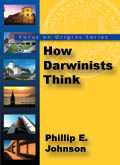
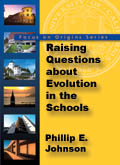
How Darwinists Think
Raising Questions about Evolution in the Schools
Two questions we often hear at ARN are 1) do you have any recent lectures videos available by Phillip Johnson? and 2) how is Phil Johnson doing since his stroke a couple years ago? Is he still actively writing and lecturing? We have some new products that should answer both of those questions for you.
We have two new lectures by Phillip Johnson that he delivered at Northern Michigan University in October: How Darwinists Think and Raising Questions about Evolution in the Schools. Initially these videos will only be available as part of our annual fund drive. For a donation of $50 or more we will send you one of the videos and for a donation of $100 or more we will send you both (VHS or DVD).
This is our Annual Report edition of ARN-Announce and will be a lengthier message as we look back over the past year, and preview plans for next year. If you are short on time and want to make your donation and receive the new Phil Johnson lecture videos, just scroll down to the bottom, make your donation and request your videos.
There are different ways to measure the progress of a movement, but as I glance back over this past year I am encouraged by several events that indicate the Intelligent Design movement is growing and thriving.
First is the continuing effort to break the grip that materialists have on our public schools. That grip is most obvious in the science textbooks and science standards adopted by each state, that teach that Darwinian evolution is an unchallengeable fact of science with no reasonable alternatives. Last year we saw some progress in Ohio and Georgia. This year the materialist grip started to slip in New Mexico and Texas.
State Science Standards
In New
Mexico one newspaper exclaimed “Evolution science staying in schools”
after the Board of Education approved a new science standard.
What they didn’t report was that “Evolution religion” had
been removed. The new draft standard had been replete with materialistic
dogma and ideology. Through the involvement and insistence of several
proponents of Intelligent Design (including Dr. Rebecca Keller, author
of RealScience-4-Kids and research chemist at the University of New
Mexico), the curriculum committee agreed that dogma had no place in good
science education and most of the offending remarks were removed. Furthermore,
even though evolution would be taught as the leading scientific view for
life on earth, the Education Department made it clear that developing critical
thinking skills was an important part of science education and students
and teachers were free to question evolution theory.
During the meeting of the full board, Steven Sanchez of the State Dept. of Education read a statement that ultimately was incorporated into the Standards by way of clarification: “In no way do these standards diminish student’s opportunity to examine other ideas nor exclude them from exploring data, observations, and other views that contribute to valid scientific inquiry. In addition, these standards do not present scientific theory as absolute, but rather engage students in the process of question and analyze existing data.”
In 1996 a previous version of the New Mexico science standard had removed all references to evolution. So Darwinists view the adoption of the new standards as a great victory. However, ID proponents have never advocated removing evolution from public education. The ID agenda is 1) that only the scientific aspects of origin theories be taught in the science classroom, and that 2) students and teachers be allowed to critically examine the scientific evidence for and against such theories. The New Mexico standards are a step in the right direction.
High School Biology Textbooks
Another battle was waged in Texas,
a state that has considerable influence on textbook publishers. The science
textbooks were up for review and opponents and defenders of Darwinism showed
up in mass to testify before the State Board of Education. ID supporters
had two objectives. To get the erroneous evidence for evolution removed
from the textbooks, and include coverage of the peer-reviewed scientific
weaknesses of evolutionary theory. The State Board of Education approved
the 11 Biology textbooks, but Texas Education Agency Director Robert Scott
said any factual errors in the books would be addressed by publishers before
the books become available. One out of two is not bad.
While the slow-but-steady progress at the state level is encouraging, more dramatic progress can be seen as notable Darwinians start to leave the sinking ship. Such was the case this year when the Discovery Institute announced that evolutionary biologist Dr. Stanley Salthe had signed the national list of scientists skeptical of Darwinism. Dr. Salthe had this to say: “Darwinian evolutionary theory was my field of specialization in biology. Among other things, I wrote a textbook on the subject thirty years ago. Meanwhile, however I have become an apostate from Darwinian theory and have described it as part of modernism’s origination myth. Consequently, I certainly agree that biology students at least should have the opportunity to learn about the flaws and limits of Darwin’s theory while they are learning about the theory’s strongest claims.”
New ID Books
Numerous books were added to the debate this year from many points of
view, but two of particular note that we added to the ARN catalog include
Law, Darwinism, and
Public Education by Frank Beckwith, and Doubts about Darwin
by Tom Woodard.
Beckwith’s book gives a valuable summary of the legal debate over teaching origins in the United States, and provides a concise overview of the Intelligent Design movement. Beckwith concludes that the infusion of intelligent design into the origins debate has changed the legal landscape significantly. If the Court’s standard in Edwards is carefully followed, Beckwith believes a policy or statute could be crafted and upheld that would require or permit the teaching of ID in public schools.
Woodward’s book on the other hand provides a detailed history of the ID movement from a rhetorical point of view. The book provides a valuable summary of many of the key critiques of Darwinism over the past 20 years, and a glimpse of some of the key personalities involved and significant events.
A favorite discussion topic at coffee shops these days is “When did the Intelligent Design Movement begin?” Some claim it started in 1991 with the publication of Phil Johnson’s Darwin on Trial. Others point back to 1985 and the publication of Michael Denton’s Evolution: A Theory in Crisis. Still others refer to the 1984 publication of The Mystery of Life’s Origin by Thaxton, Bradley and Olsen. Of course we know it really started with the formation of Students for Origins Research in 1977. But regardless of when you think it started, the two books by Beckwith and Woodward illustrate that ID has a significant history and a real future.
Now I’d like to review some of our contributions this past year at ARN.
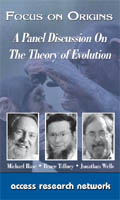 New
ARN Video
New
ARN Video
On the Theory of
Evolution: Panel
Discussion with Jonathan Wells, Michael Ruse, and Bruce Tiffney
In keeping with the ARN tradition, we continue to seek out quality lectures, debates and interview to package in video format so you can get a taste of how the ID movement is unfolding in the academic community from your easy chair at home. This one happens to be a panel discussion in which three of the big names in the business take on an interesting and congenial exchange of views.
Ruse, Tiffney, and Wells bring their collective intellect, expertise, disagreements and humor to bear on three important themes in the origins debate: 1) the nature, aims and limitations of science 2) the contemporary status of evolution as a scientific theory and 3) the political dimensions of contemporary discussion and debates of evolution in American education. If you have never heard Michael Ruse speak before, you will enjoy the wit and sense of humor of this ID critic, who at times appears to side more with Jonathan Wells than materialist Bruce Tiffney.
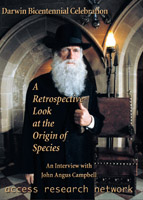 New
ARN Video
New
ARN Video
Interview with
John Angus Campbell on the Rhetoric of Charles Darwin
Everyone talks about Darwin’s On the Origin of Species, but few people have read it, and there is only one person I know of that has made a career out of analyzing its arguments. John Angus Campbell is currently professor of Speech Communication at the University of Memphis and has taught rhetoric for over twenty years. In this engaging interview Campbell explains why Darwin’s On the Origin of Species had such an impact. Campbell dissects various chapters in the book and explains that it was Darwin’s rhetorical brilliance that won over his readers, more than the scientific evidence.
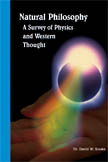 New
Physics Textbook from ARN
New
Physics Textbook from ARN
Natural Philosophy: A Survey
of Physics and Western Thought
David Snoke is an Associate Professor of Physics and Astronomy at the University of Pittsburgh. Several years ago he was asked by a homeschool group to teach a physics course for high schoolers. What started as a single class has turned into a new high school textbook and a new integrated approach to teaching physics. Not only does the book answer the question “What should every educated person know about physics, assuming that he or she never studies physics again,” but it does so in an integrated fashion presenting some advanced topics of philosophy and theology along the way. In addition to homeschoolers, this book is currently being consider as an introductory college text, and has also been popular with adult readers looking for an introductory book on physics, presented in the context of Western philosophy and theology.
ARN Web Resources

Every month we add new ID resources to the ARN website: news articles, books, videos, papers by featured authors, and messages on our ID discussion forum. However, I think one of the best additions in 2003 was the monthly column by physician Howard Glicksman called Exercising Your Wonder. In this month’s column Dr. G enlists the help of Hamlet to discover why bone formation defies explanation by standard macroevolutionary theory. Click on the link above to find out what’s really rotten in Denmark.
 RealScience-4-Kids
Update
RealScience-4-Kids
Update
Three years ago ARN teamed up with Dr. Rebecca Keller to launch RealScience-4-Kids (RS4K), a new science curriculum targeted for elementary and middle-school children (homeschool, public school and private school). The approach was novel: teach younger children the basics of “real science” at an early age, without the intimidating math and help them develop a confidence and love for chemistry, biology and physics. Judging by the testimonials from ecstatic homeschoolers (both scientists and scientific novices) we’d say RS4K has been a big hit. Here are just two examples:
I am a graduate student in Physical Chemistry at The University of Wisconsin-Madison, with three years experience lecturing at the college level, plus seven years as a teaching assistant at the college level. I gave my final exam for RS4K Chemistry I to my own children over the weekend. I've been totally impressed with the program.
I never thought of teaching my kids science because I was always unimpressed with the "Gee, lets throw some baking soda in vinegar and watch it fizz" where you never saw “Why” the soda and vinegar fizzed. I had resigned myself to waiting until my kids knew some algebra before I started teaching science.
My oldest daughter was ready to do pre-algebra so I thought I'd start I was looking for some Jr. High Level science for her. That is when I saw the RS4K chemistry text. I looked at the table of contents and said to myself, "This looks like a Freshman College text book" and then looked at the content and saw "This is grade school level." I was very impressed on how Dr. Keller was able to remove the math from the material without loosing the “Why” things are happening.
When I’ve shown this material to the profs here at UW-Madison, the normal response is an incredulous, “You are teaching this to grade-school kids!??” They are all just as impressed with the quality of this material as I was when I saw it.
My kids all enjoyed the class immensely. I taught my oldest four (1st grade, 3rd grade, 4th grade and 6th grade) and they all got a great deal out of the course. The older ones had worked through some other texts with my wife, but still learned much more from this course. My 1st grader had a little trouble with some of the material, but overall she did very well. It was very easy for my 4th and 6th graders and was perfect for my 3rd grader.
I’ve already purchased the Biology I text and am going to do this class over the summer -- The best time to teach Biology! When you can go digging muck out of the lake and look at it under a microscope. ;-) I showed the text to one of my friends who is a bacteriologist and she was just as impressed with it as I was with Chemistry I, so I’m looking forward to another good experience.
-- John Bak,
Madison WI
from the RS4K Discussion Forum, May 19, 2003
http://www.arn.org/boards/ubb-forum-f-11.html
Just wanted to let you know that I have been teaching RS4K Chemistry Level I to my children ages 10 and 11 and we are absolutely loving it! I have to admit that the only Chem background I have is my 8th grade year of Middle School but my children and I are learning so much!! My son looks so forward to this class. He is comprehending everything and really getting the picture of how it all fits together. We were doing a lesson on Chemical Reactions today and he was comparing it to the motor on his go cart and started talking about oil mixing with gas and making combustion. He says that he loves doing the laboratory manual. We have done all the basic science stuff and I have never seen them so excited about science and this is very refreshing because it is challenging. This has impressed me to no end. The children are actually thinking for themselves and having a great time! Thanks so much for writing this and we look forward to doing Biology next spring.
-- Beth Bowman, Tennessee
May 2003
In order to accelerate the printing and distribution of the curriculum (beyond what we are able to do as a small non-profit), Dr. Keller has recently formed her own company, Gravitas Publications, and is pressing forward to make the print versions of Biology Level I and Physics Level I available as soon as possible. After those two units are made available, she will focus on the Level II curriculum for middle schoolers. We wish we could provide firm dates for the availability of the Physics I and Level II units for those of you using the curriculum and wanting to plan your teaching schedule, but it will probably be a few months before we have the new schedule information.
In the near future Dr. Keller will host a new RS4K website at www.realscience-4-kids.org ARN will continue to distribute the RS4K curriculum and continue to maintain the current RS4K website at www.arn.org/realscience/realscience.html which can also be accessed from the ARN home page at www.arn.org. Be sure to check the website for the latest schedule information for the Biology I and Physics I print editions. Meanwhile, you can still order the Chemistry I print edition and the Biology I CD edition.
As she makes plans for the future of the RealScience-4-Kids curriculum, Dr. Keller would love to hear from current users of the curriculum. If you have enjoyed the curriculum, or have ideas on how it could be improved, please contact Dr. Rebecca Keller at gravitaspublications@comcast.com.
We’d like to welcome Tristan Abbey who has joined our staff as a Senior Editor for our student website (www.idurc.org). Tristan is a high school senior who got involved with ID in 10th grade because he wanted to challenge his Biology teacher who was espousing the standard Darwinian party line. You can read a little about his experience at Dear Young IDists. You might also enjoy the IDURC interviews with Michael Behe and Jay Richards. The goal of IDURC is to serve as a network to connect junior high, high school and college students interested in learning more about Intelligent Design. Tristan would also like to recruit some students to help write papers, editorials and articles to post at IDURC and elsewhere. If you would like to get plugged in, contact Tristan at tabbey@idurc.org or sign up for the IDURC discussion group at http://groups.yahoo.com/group/idurc.
Now for the donation pitch. We have some exciting plans for 2004, but we are dependent on your financial support to help make these exciting new products available. Here is a preview of some of the products we are ready to release with your help:
 Online
Edition of the Origins & Design Journal
Online
Edition of the Origins & Design Journal
One of our goals this past year has been to get our journal, Origins & Design, up and running as an online publication. We ran in to some technical difficulties, but hope to get the problems resolved soon and get the latest issue online ASAP. The first issue will look a lot like the old print version of O&D, but we plan on publishing shorter, more frequent editions, as soon as we get our online technology working. We also plan to make other web resources available to our online subscribers. If you are a current O&D subscriber, you will receive credit for each issue of O&D you had left on your subscription. You will also receive a mailing with you username and password to sign on to the subscription areas of the ARN website. Thank you for your patience as we try to make this transition to an online journal.
 |
 |
Our best selling product this past year was the ID Documentary Unlocking the Mystery of Life. The stunning graphics and clear presentation of the evidence for Design by the movement’s leaders made this an instant best seller. Two related products will soon be available from the producers of Unlocking and we will be featuring these products as soon as we have them in stock.
In our next announcement you will be able to order Where Does the Evidence Lead which is a version of Unlocking the Mystery of Life that has been edited for use in the classroom. The material has been segmented into 6 ten-minute sections that makes it easy to comprehend and discuss in a homeschool or classroom situation.
The Privileged Planet will be available later in the year and is subtitled Unlocking the Mystery of Life, Part II. This video shifts the focus from the world of biology to the evidence for design from astronomy and cosmology.
![]() We
currently have seven new ARN lecture and interview videos in the works for
next year including an interview with Phillip Johnson based on his latest
book The Right Questions: Truth, Meaning & Public Debate. Your
donation to ARN will help us make these valuable educational resources available
to a wider audience. Keep reading below to find out how you can contribute
a tax-deductible donation to ARN and receive one of Phillip Johnson’s
recent lecture videos.
We
currently have seven new ARN lecture and interview videos in the works for
next year including an interview with Phillip Johnson based on his latest
book The Right Questions: Truth, Meaning & Public Debate. Your
donation to ARN will help us make these valuable educational resources available
to a wider audience. Keep reading below to find out how you can contribute
a tax-deductible donation to ARN and receive one of Phillip Johnson’s
recent lecture videos.

 ARN
Donation offer: Two new lecture videos by Phil Johnson
ARN
Donation offer: Two new lecture videos by Phil Johnson
How Darwinists Think
Raising Questions about Evolution in the Schools
In October of this year Phillip Johnson lectured twice before a large audience of students, faculty members, and community people at Northern Michigan University in Marquette, MI.
In his first lecture, How Darwinist Think, Phillip Johnson explains that it is the thinking of evolutionists that gets them into difficulty. He works to open up the issue and allow light to flow in. Johnson begins with the Darwinian high-water mark: the 1959 centennial celebration of the publication of Charles Darwin’s The Origin of Species. He describes some of the experiments and findings of the 1950s and how they led Darwinists to a sense of triumph, not just over science, but over our whole understanding of the world. Johnson then shows how supposed evidence for evolution has fallen into question and other concerns have arisen so that the triumphalism of 1959 has been reversed and the Darwinists are now on the defensive. The video includes a lively 45 minute question and answer session with the audience.
In the second lecture, Raising Questions about Evolution in the Schools, Phillip Johnson describes the Santorum resolution and how it is intended to open up education, so that evidence both for and against evolution can be taught. He explores the question of what might happen if there were truly freedom of thought and expression in the schools. He also considers why the major science organizations are so upset at the idea that intellectual freedom might be extended to this subject. The video includes a lively 45 minute question and answer session with the audience.
So if you have benefited from the ARN website or products in the past years, would like a copy of Phil Johnson’s latest lecture video (VHS or DVD), or just want to support our mission “to provide accessible information on science, technology and society issues from an intelligent design perspective” please take this opportunity to support the work at ARN with a donation. Much of the work at ARN is accomplished by a network of dedicated volunteers. However, as with any organization, we still have expenses to pay to keep the website operating and produce new products. We are dependent on donations from individuals like you to accomplish the ARN mission. Those who are able may want to consider a larger donation, a stock donation, or joining our Gideon Group who support ARN with regular monthly donations.
There are three easy ways you can send a tax-deductible donation to us:
Secure Online Donation with credit card. To donate online
with your credit card simply click on one of the desired video title
links above to make your donation and receive the video. If you would
like to donate more than the $50 amount, or you would like to donate
but don’t want a copy of the video, you can click on the general
donation link below:
http://www.arn.org/arnproducts/donation.htm
Call our toll free number at 1-888-259-7102 and leave us a message with your credit card information and request for the desired video lecture. This is a dedicated voice messaging system for ARN that is only accessible by our staff. You may leave your information or request that one of our staff call you back.
Put a check in the mail. Send a check made out to ARN to P.O. Box 38069, Colorado Springs, CO 80937. If you would like the video, add that to the memo field on your check.
ARN is a 501(c)3 Educational non-profit. All donations in excess of services or goods provided in return are considered tax-deductible by the IRS. Contact your tax advisor for further information. A receipt will be mailed for all donations.
I hope you have enjoyed our annual update on what’s happening at ARN and the Intelligent Design movement and we hope to hear from you soon.
All of the ARN products can be ordered through our web catalog store with secure credit card ordering. There you will find a description of each product and you may add as many products as you would like to the electronic shopping cart. When you have finished, select the type of shipping (Priority for faster delivery, or Book rate for lowest cost) and send the order. If you provide your email address, you will receive an email receipt of your order. Place your order today online at www.arn.org (click the products links on the top menu bar). If you have any problems or questions, or would rather place your order by phone, call our toll free number at 1-888-259-7102 and our staff will be happy to assist you (or leave your order with our voice mail system if we are out of the office).
ARN-Announce describes many of the upcoming events and new articles, books, videos and other resources on Intelligent Design. Please forward this message to several of your friends and colleagues to let them know about the resources available at Access Research Network (www.arn.org). Back issues of ARN-Announce can be found at www.arn.org/announce.htm
ARN-Announce is written by Dennis Wagner (dwagner@arn.org)
Access Research Network is a non-profit organization dedicated to providing accessible information on science, technology and society issues from an Intelligent Design perspective.
Mailing Address:
Access Research Network
Contact:
(719) 633-1772 voice
(719) 520-1241 fax
(888) 259-7102 toll-free order line
On the web:
www.arn.org
TO ADD YOURSELF TO ARN-ANNOUNCE:
Send an email to "ARN-Announce-request@arn.org".
The body of the message should consist of the word "SUBSCRIBE" and
nothing else. Or visit the web page at www.arn.org/announce.htm
and select Subscribe and enter your email address. You will receive a confirmation
email indicating your name has been submitted to the list. Follow the directions
and reply to the email and your email address will be added to the ARN-ANNOUNCE
list.
TO REMOVE YOURSELF FROM ARN-ANNOUNCE:
Send an email to "ARN-Announce-request@arn.org".
The body of the message should consist of the word "UNSUBSCRIBE"
and nothing else. Or visit the web page at www.arn.org/announce.htm
and select Unsubscribe and enter your email address. Your email address
will be automatically removed from this list.
Copyright 2003 Access Research Network. All rights reserved. International copyright secured.
12.1.03